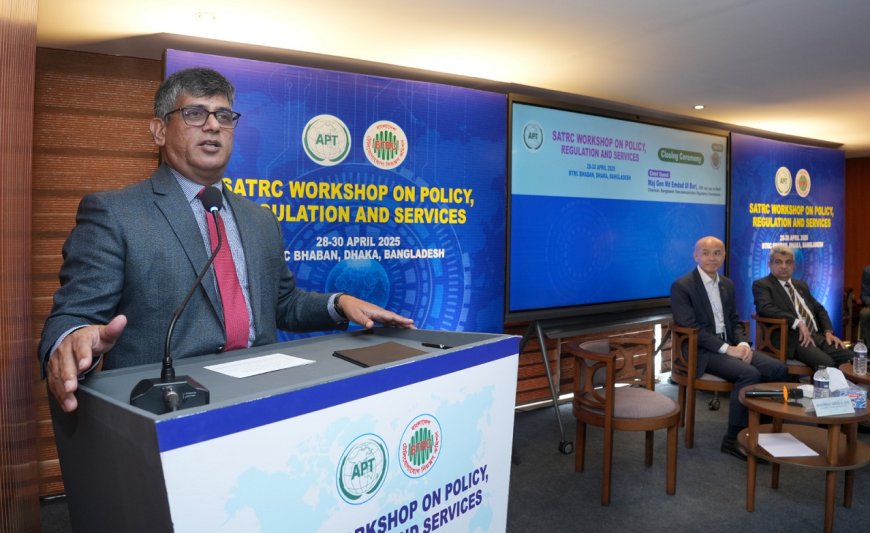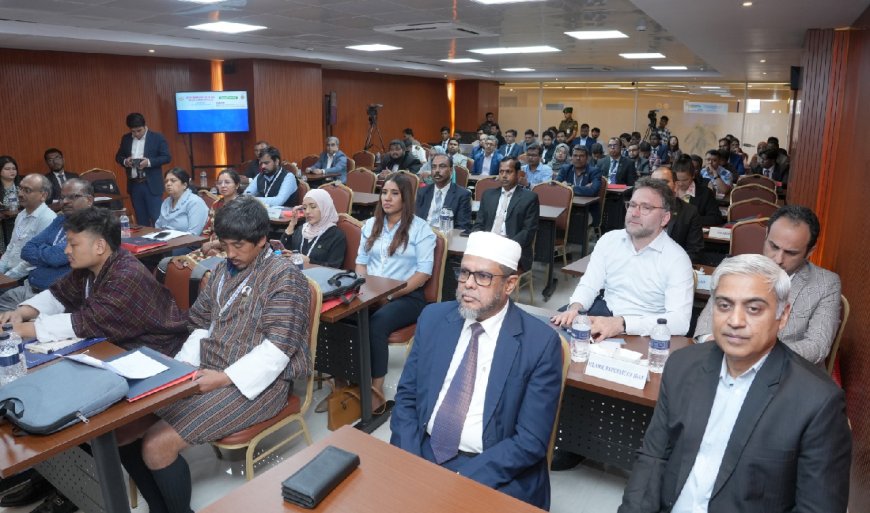Telecom Tenacity Tackles Transformation: Dhaka Hosts South Asian Policy Workshop

A three-day workshop on policy planning for regulatory bodies of nine South Asian countries was held in Dhaka, focusing on resilience and innovation in the telecom sector amid accelerating digital transformation. Organized by the Bangladesh Telecommunication Regulatory Commission (BTRC), the event took place at the BTRC headquarters in Tejgaon and brought together regulators, telecom operators, policy experts, and stakeholders from across the region.
The sessions explored a wide array of emerging issues including the regulatory challenges of 5G, Artificial Intelligence (AI), Internet of Things (IoT), e-waste management, digital security, future tariff policies, and the socio-economic impact of telecom and ICT services.
With the goal of promoting sustainable telecom policies, governance, and services through regional collaboration, the workshop featured ten sessions and presented a total of 40 research papers related to telecommunications and ICT.

In the closing session on Wednesday, April 30, BTRC Chairman Major General (Retd.) Md. Emdad Ul Bari noted the shared economic, social, and cultural traits among South Asian countries. “We must reduce the connectivity gap and internet usage gap among people in this region. Only then can we overcome the challenges of the digital divide,” he said. He added, “Around 60 to 70 percent of internet usage in Bangladesh is limited to entertainment. Therefore, expanding the scope of digital services is essential to ensure productive use of the internet.”
Secretary General of the Asia-Pacific Telecommunity (APT), Masanori Kondo, praised BTRC for successfully organizing the workshop and emphasized the importance of mutual knowledge sharing. “Mutual exchange of knowledge and experience will play a vital role in shaping future policies and devising creative solutions to emerging challenges for South Asian nations,” he remarked.
Dr. Khawar Siddique Khokhar, Member of the Pakistan Telecommunication Authority and Chair of the SATRC Workshop on Policy, Regulation, and Services, commended Bangladesh’s hospitality, describing it as beyond expectations. He emphasized the need for cooperation and knowledge-sharing among South Asian telecom regulators to tackle policy and regulatory challenges, noting that such workshops provide a valuable platform for that collaboration.
Among others, BTRC Vice Chairman Md. Abu Bakar Siddique and Commissioner of Engineering and Operations Brigadier General Iqbal Ahmed participated in the event, along with senior officials from the regulatory bodies of Bangladesh, India, Pakistan, Sri Lanka, Nepal, Bhutan, Afghanistan, Maldives, and Iran. Representatives from telecom operators, technology experts, and both government and private sector organizations were also present.

On the opening day, sessions addressed the challenges faced by regulatory bodies in the age of emerging technologies, the effective use of Universal Service Funds (USFs), and e-waste management. Speakers emphasized that expanding telecom infrastructure and services in underserved and remote areas, along with bridging the digital divide, require effective utilization of USFs. Experts also noted that while 5G, AI, and IoT have revolutionized fixed and mobile broadband, they have simultaneously raised new concerns regarding personal privacy, cybersecurity, and equitable access to digital services. On e-waste, panelists pointed out the growing global volume and its environmental and public health implications, stressing the urgent need for effective e-waste management in South Asia, where ICT use is rapidly expanding.
The second day focused on “digital consumer protection, online scams, and financial fraud” and “future tariff policy amidst emerging telecom/ICT services.” Speakers highlighted that while technological innovation creates unprecedented opportunities, it also exposes consumers to new risks such as scams and digital financial fraud. Citing forecasts that cybercrime-related financial losses will reach USD 10.5 trillion globally by 2025, panelists stressed the need for regulators and industry stakeholders to enhance consumer protection frameworks.
In the tariff policy session, participants discussed the shift from circuit-switched to IP-based networks over the past decade in South Asia, which has significantly transformed the telecom landscape. This shift has also introduced challenges in network topology, service delivery, and pricing mechanisms. Experts also highlighted the role of AI, big data, and similar emerging technologies in developing smart infrastructure in both urban and rural settings.
On the final day, discussions centered around net neutrality and digital transformation. Speakers noted that technology neutrality presents South Asian countries with ample opportunities to drive digital transformation, tackle socio-economic challenges, strengthen regional connectivity, and improve citizen services. Achieving these goals, they argued, will require investments in robust ICT infrastructure, increased public-private partnerships, and the adoption of a unified, multi-dimensional strategy and regional policy framework.









































































































































































































